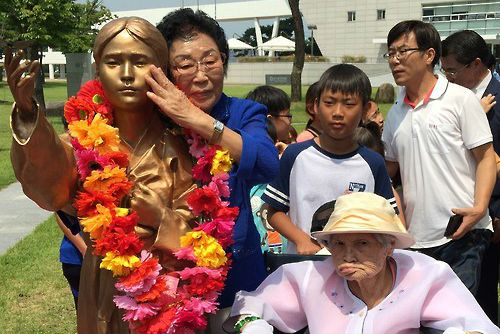
A few days ago, Shinzo Abe expressed profound grief for Japan’s wartime past in his war anniversary statement but there is no fresh and direct expression of apology of the kind that we Koreans expected. Some locals criticized him for his lukewarm attitude. I was also angry that he still remained vague with his acknowledgement of the female victims referred to as Comfort Women. Abe did not deliver any direct apology towards this issue which has been one of the biggest obstacles between Korea and Japan. The disappointment of surviving victims of wartime sex slavery is beyond all words. I cannot even begin to imagine how much they have been suffered from the past.
On the other hand, former Japanese Prime Minister Yukio Hatoyama visited Korea and kneeled before a memorial monument at the Seodaemun Prison. His step attracted all of the nationwide press and some of them covered the issue comparing it with Willy Brandt, the former Prime Minister in West Germany, who made history by visiting the memorial tower of victims of the Holocaust in Poland. During the talking time with the press, Prime Minister Hatoyama argues that current Japanese leader, Shinzo Abe, must offer a heartfelt apology for Japan’s colonial rule over Korea. Moreover, the most impressive expression he used during his speech was that “It is important to speak from the heart.” It could not derive from a direct effect to Abe’s statement but it was the clearest expression of contrition for Japan’s wartime wrongdoings I have ever seen.
Last August 14th was International Memorial Day for Comfort Women. To coincide with the day, several events including the unveiling of monuments for Comfort Women were held in some regions such as Gwangju, Jeonju and Wonju. The surprise thing that caught my eyes was the idea of making a “girl of peace” statue in Gwangju which was led by only a young man. He started this project with his volunteering group of colleagues. There were many hardships from funding money to looking for an artist to make the statue, but thanks to many citizens, it was established in the Gwangju Metropolitan City Hall Square. The statue is characteristically different from others in other regions because it is an only standing statue among them in order to get rid of passive attitudes and to pray for world peace and human rights. Everyone who visits the City Hall can hug the small girl to keep in mind our painful past and comfort the statue through the citizen’s continuous attention.
Like the old saying, a nation that forgets its past has no future, we should not forget the scar in the past and keep focusing on the issue. However, these days many young people are indifferent to the painful history in the past. In retrospect, I am too ashamed that I did not remember the meaning of the values of our historical scars. I was just angry and critical about the reaction of the Japanese government, but there is no active action or serious agony about the issue. From the recent heartwarming actions of Hitoyama and the citizens of Gwangju, I realized one person’s little action can make meaningful things and raise the large power from the citizen. I wish that people should not forgot the scars and Japan will eventually deliver a real, heart felt apology for the victims before the time flies.
By Oh Hee-su, Editor-in-Chief

